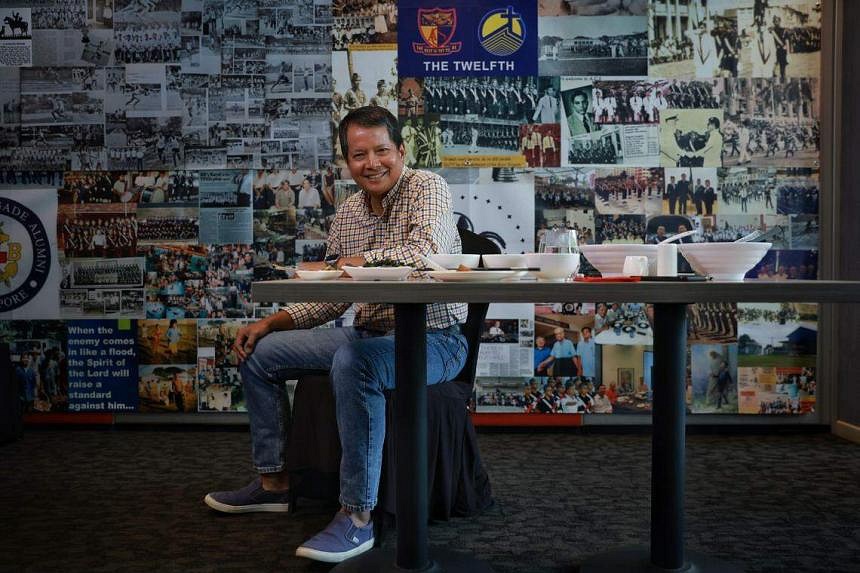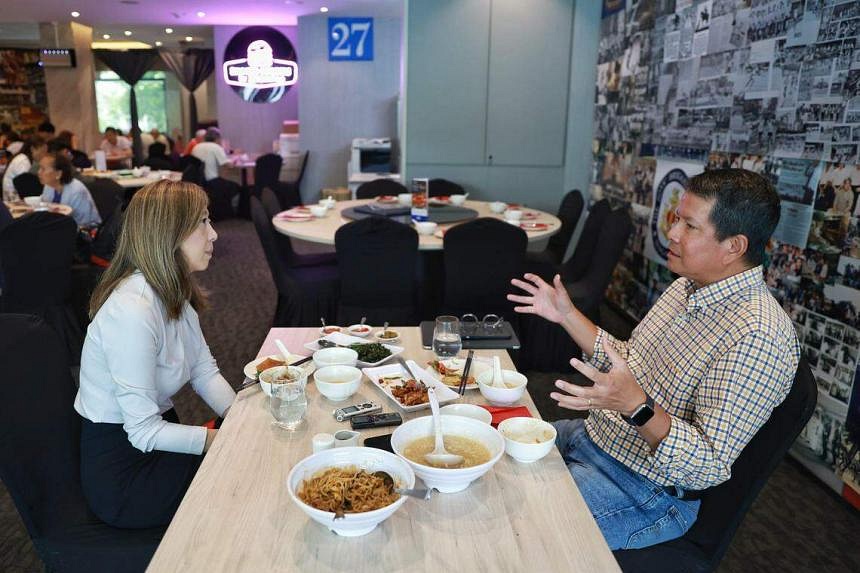Lunch with Sumiko
ACS boys feel like they own the school, a principal once told Richard Seow. His reply: That’s a good thing
At Anglo-Chinese School, Richard Seow made headlines for his running. Now chairman of the school’s board of governors, he has had to set ACS on a new path.
There’s no escaping Anglo-Chinese School in the restaurant Richard Seow has chosen for lunch.
From floor to ceiling, the walls of New Ubin Seafood in Stevens Road are plastered with copies of old photos and clippings of the school.
It’s an exhibition of Boys’ Brigade activities, sports meets, portraits of principals and Bible verses. The school’s motto appears in a sign that reads Stay Calm Because The Best Is Yet To Be.
The walls are both a paean to ACS and a marketing tool. Many alumni get-togethers are held at this restaurant chain.
I arrive half an hour early for the interview with Mr Seow, who chairs the ACS board of governors. He is already there, in conversation with New Ubin’s owner – and proud ACSian – Pang Seng Meng.
Our lunch takes place a few days after an ACS town hall to discuss controversial changes to the 137-year-old Methodist mission school for boys.
On Feb 9, the Ministry of Education (MOE) announced that ACS Primary – one of ACS’ two primary schools – will move from Barker Road to the new Housing Board town of Tengah in 2030. More astonishingly, it will take in girls from that date.
ACS will also partner the Methodist Welfare Services to set up a special education school for children with autism, to be sited next to ACS Primary in Tengah.
The news caused ripples around town.
Non-ACSians sniggered that ACS, long stereotyped as an elite, rich man’s institution serving the upmarket districts its schools are located in, would become a “neighbourhood” school.
(Its other schools remain in prime areas – ACS Junior in Winstedt Road, ACS Barker in Barker Road, ACS Independent and Anglo-Chinese Junior College in Dover, and ACS International in Holland Village.)
Some alumni fretted that going co-ed would destroy the school spirit and its heritage. Others complained about the distance to Tengah – more than 12km from Barker Road – and also raised school affiliation issues. A group was angry that the board did not consult the fraternity of passionate alumni about the changes.

Amid the clamour, Mr Seow, 61, is staying calm, or trying to.
“My wife basically said, ‘Be nice, people are unhappy, listen to their complaints, don’t scold them’,” he says of her advice before the town hall.
He takes the optimistic view that those with no issues would have skipped the town hall. Of the 200 to 300 who attended, most were fine in the end, he says.
“We do what we can, when we can, but we know not 100 per cent of the people will be on board, and that’s fine.”
First, though, we need to settle our food, and we catch the eye of one of the waiters.
New Ubin Seafood touts “truly Singaporean cuisine”, and the menu features favourites like chilli crab and claypot tofu.
“You choose,” he tells me.
(We have met before through a mutual friend, but don’t know each other well. He’s one year my senior and although I studied at ACJC, our paths didn’t cross because he had gone off to study in the United States by then.)
The fried brinjal is good, I say.
“We’ll just eat fried brinjal. We can do light,” he replies.
He’s not joking.
You’ve got to choose something, I say.
“Nope, you are going to make me work, so you can choose,” he says.
I insist, and he opts for a vegetable – kai lan.
Noodles or rice, I ask. “Whatever is light,” he says, unhelpfully.
The waiter suggests Hokkien mee, and I go with that.
Meat? I tempt him. “No need.”
I wonder if he wants to keep our bill small. I could be right because he asks what’s the cheapest interview lunch I’ve had.
In the region of $15, I say.
Soup? I make a last attempt.
He gives in and nods.
The waiter says the restaurant is serving only one soup – fish maw. Sounds good, I say, without looking at the menu.
When the bill comes, the soup is, alas, a hefty $51. It was a big bowl, though, enough for four people and included premium swimmer crab.

True blue ACSian
To say Mr Seow is a staunch ACSian would be an understatement.
On his WhatsApp profile description, he has added the school’s The Best Is Yet To Be motto. Several times during lunch, he quotes the Christian ideals of Bishop William F. Oldham, the Methodist missionary who founded ACS in an Amoy Street shophouse in 1886.
Even his checked shirt echoes the school colours of yellow and blue.
Over our two-hour lunch, it emerges that he is a devout believer in the school’s Methodist ethos, is proud of ACS’ rich history, and is grateful for the teachers who encouraged him and gave him self-confidence.
“I wasn’t a top student, but they had confidence in me and that confidence, I think, has lasted me all my life.”
He certainly comes across as self-assured, to the point some might say aloof. But friends attest to how he is loyal, kind and generous to those he cares about, and will go out of his way to help them.
He says he treasures the lifelong friendships he made in school, takes pride in how ACS has produced well-rounded students, and loves the sense of family.
When he was studying at Barker Road, there was a young woman helping her father at a laksa stall at the canteen. She’s now running the drinks stall at ACS (Independent). “It’s generations, not just of students and parents, but also canteen operators. It’s really, really nice.”
He sees ACS as “a special gift that will last and continue only if it is shared and passed on”.
His own family is a good example of this, with an unusual five generations of ACSians.
It started with his great-grandfather Seow Poh Leng, one of the founders of Ho Hong Bank, which became part of the Oversea-Chinese Banking Corporation.
In 1936, the patriarch instituted a medal in his name to be awarded to the top ACS boy at the Senior Cambridge/GCE O-level exam each year. It is still handed out today. No one in the family has come close to winning it, Mr Seow adds.
His grandfather, Sieu Jin, a banker whose wife was English, went to ACS, as did his father Gordon, who was trained as a lawyer, became an oil trader at Shell and was later Singapore’s Commissioner to Hong Kong.
His mother Eileen taught at ACS Primary when it was in Coleman Street. His younger brother David, a children’s book author, studied in ACS. His older sister went to ACJC.
His three sons, now aged 27, 26 and 24, continued the tradition. His 30-year-old daughter studied at St Nicholas Girls’ and an international school.
Mr Seow, who grew up in the Cairnhill area, says his first memories of ACS Junior, then in Barker Road, were of getting free milk and brushing his teeth by the school drain.
He shone in sports and made the news in 1978 for clocking 10.83 seconds in the 100m. With his good looks, he was also the subject of many a schoolgirl crush back then.
At ACJC, he met his future wife Jacqueline, who was from St Nicholas. They married when he was 27. She’s a lawyer and the family now lives near Holland Village.
After his first year at JC, he went to the University of Oregon, which has a famous athletics programme, but injuries cut short his running ambitions.
He got a BS Economics from there and an MBA from the University of Southern California, and spent 16 years in investment banking including at JP Morgan, Goldman Sachs and Citicorp.
From banking, he became senior adviser to TPG Capital, a San Francisco private equity firm, and was also chairman of healthcare group Parkway Holdings from 2005 to 2010. He’s still with TPG and chairs Pathology Asia Holdings, which runs diagnostic laboratories.
On the community front, he was, among other things, chairman of statutory board Sport Singapore from 2010 to 2018.
It’s an impressive CV. You have had a charmed life, I tell him.
“I know I’m blessed, I know I don’t deserve to be this blessed,” he says. “I guess my driving force is, in the time that I have, I need to give back and to help the next generation reach their potential.”
Family ties
He was on the ACS board of governors for two years before he became its chairman in 2008.
His involvement came about after he complained about the education system to his wife. “She said, ‘well, if you have a complaint, why don’t you go and help?’ She called my bluff.”
He views Singapore’s education system as good but not perfect, but much better than many other countries’. “We should not rest on our laurels,” he insists.
An ACS in the heartland and a special education school were long on his mind. He had also mentioned this in a 2014 interview with The Straits Times, when asked what ACS was doing to help spread its success to other communities.
Both suggestions were not taken up by the authorities. In fact, ACS had offered three proposals on a special school.
ACS Primary’s move to Tengah has its roots around late 2021, when the Government tweaked the policy on Primary 1 places reserved for children of alumni.
During discussions with MOE, ACS was told its lease in Winstedt Road, where ACS Junior is now located, would not be renewed when it runs out in 2039.
The board had to plan for a new site, and knew it was unlikely it would get one in a central district.
It saw another problem looming: Singapore’s declining birth rate has resulted in MOE merging and closing schools. With two ACS primary schools about 2km apart, there was a risk – “low but not zero” – of them having to merge in time.
MOE’s offer of Tengah would mean an annual enrolment of at least 330, larger than ACS Primary’s current 240 and ACS Junior’s 270.
The board decided to relocate ACS Primary as it is the smaller school. With enhanced enrolment in Tengah, the total number of places would be bigger. When the Winstedt lease is up, ACS Junior will move to Barker Road.
MOE’s condition that the Tengah school be co-ed was a sticking point. But ACJC and ACS International have taken in girls and “our culture has not been weakened”, Mr Seow says. “If that is the price for moving to a new location, it is a price, but we will do it.”
The offer to start a special education school was more sudden. He was invited to meet the incoming head of MOE’s special education department and was told that the Government wanted ACS and the Methodist Welfare Services to run such a school. “I almost fell off my chair.”
It wasn’t linked to ACS Primary moving to Tengah, he clarifies. “It wasn’t a reward. They were separate.”

Issues on school affiliations are being worked out. As for the distance to Tengah, he says: “Singapore is actually quite small, and it is not that far of a distance from Barker Road, unless you live in the east coast.”
To critics who bemoan the lack of consultation, he says the board was not allowed to do widespread dialogue as the decisions were deemed to be market sensitive and have an impact on property prices.
MOE will fund 95 per cent of the school in Tengah, which means funds will need to be raised to meet the rest.
ACS is always raising funds, I say, remembering my experience in ACJC.
He responds by sharing how a principal from a government school had gone over to ACS. The principal told him that while he enjoyed being in ACS, he felt that “ACS boys feel like they own the school”.
Mr Seow’s reply: These are the people who will be the school’s most ardent supporters.
“Think of this. Each ACS boy owns the school because his father put a brick in, they went for the walkathons, they did all of that. So they feel ownership, and they take pride or get upset when people criticise their school,” he says. That’s a good thing.
ACS is a family, he stresses, and this is also seen in how the school treasures its teachers and has gatherings for them long after they have retired.
He adds: “Maybe in the old days, people donated money to get their kids in. You can’t do that any more, so you really have genuine people who want to give back.”
What does he make of ACS’ reputation for big cars and snobbish behaviour?
“There is some element of that in all schools, and that’s because Singapore has been successful,” he reasons. “We try and nurture the boys – we don’t really nurture the parents’ behaviour.”
Parents could be alumni, I say. “Some of them are, some are not,” he replies.
There’s no point worrying about labels. “You’d get caught up looking at yourself, looking at the rear mirror.”
What’s more relevant is how the school has a history of community outreach programmes, including in special education and sports, and has produced “servant leaders” who lead to serve others, he says.
With so much of his time spent on ACS, his beloved sports photography hobby has been put on hold.
On the family front, he relishes the day he becomes a grandfather.
“I was a good dad but I could have been better in terms of time,” he says.
“But I’ve told my kids, don’t worry, I’m going to be the best grandfather of all, just you wait. How many puppies, how many ice cream, I will do everything,” he adds with a big smile.
He also reminds them: “If you don’t want ACS to merge, you must have more children.”
Which, I suppose, will only mean a sixth generation of ACSians in the family.
Join ST's Telegram channel and get the latest breaking news delivered to you.










No comments:
Post a Comment